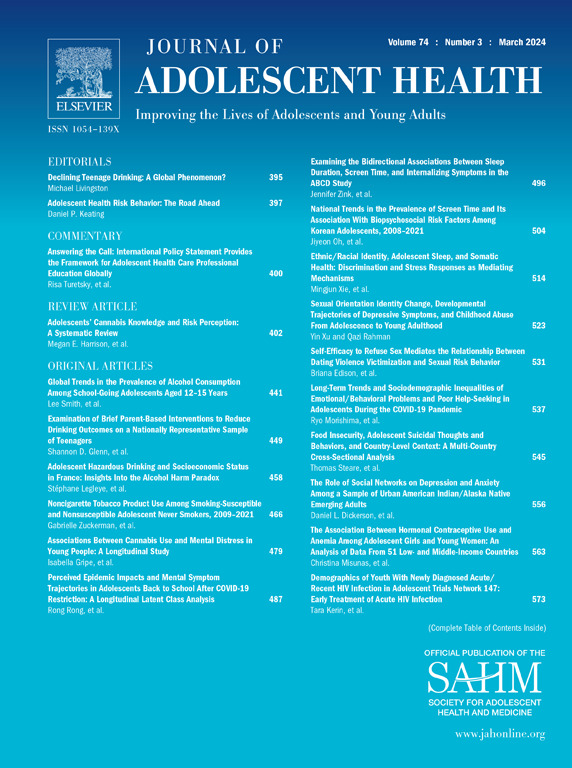School Absenteeism Among Racially and Ethnically Minoritized Transgender High School Students and Their Peers: A Cross-Sectional Study
IF 5.5
2区 医学
Q1 PEDIATRICS
引用次数: 0
Abstract
Purpose
To explore absenteeism among racially and ethnically minoritized transgender youth (trans REMY) compared to their White transgender (trans WY) and racially and ethnically minoritized cisgender (cis REMY) peers and identify associated psychosocial factors.
Methods
Biennial California Healthy Kids Survey 2017-2019 data was analyzed with a weighted sample of California's secondary school population. Students reported past 30-day absences due to mental health and harassment, depressive symptoms, suicidal ideation, cyberbullying, victimization, and school connectedness. Poisson and linear regression compared absenteeism and psychosocial factors among peer groups. For trans REMY, Poisson regression assessed associations between absenteeism and psychosocial factors. Analyses were adjusted for grade, sex, and socioeconomic status.
Results
The analytical sample (n = 25,085) included 206 trans REMY, 64 trans WY, and 24,815 cis REMY. Trans REMY had higher relative risk of absenteeism due to mental health concerns and harassment compared to cis REMY (adjusted relative risk 2.9, 95% confidence interval 2.1–4.0 and adjusted relative risk 8.1, 95% confidence interval 4.0–16.6, respectively) but similar risk when compared to trans WY. For trans REMY, depressive symptoms, suicidal ideation, and victimization were associated with higher relative risk of absenteeism due to mental health concerns. Cyberbullying was associated with a higher risk of absenteeism due to harassment. Higher school connectedness was associated with lower risk of absenteeism due to mental health concerns.
Discussion
Trans REMY reported higher rates of school absenteeism due to mental health concerns and harassment compared to some of their peers. Mental health symptoms, victimization, cyberbullying, and school connectedness were associated with absenteeism among trans REMY.
少数种族和族裔变性中学生及其同龄人的旷课现象:一项横断面研究。
目的:探讨与白人变性者(trans WY)和种族及民族少数化的顺性别者(cis REMY)同龄人相比,种族及民族少数化的变性青少年(trans REMY)的旷课情况,并确定相关的社会心理因素:对 2017-2019 年两年一度的加州健康儿童调查数据进行了分析,并对加州中学人口进行了加权抽样。学生们报告了过去 30 天因心理健康和骚扰、抑郁症状、自杀倾向、网络欺凌、受害和学校联系而缺勤的情况。泊松回归和线性回归比较了不同同龄群体的旷课情况和社会心理因素。对于跨 REMY,泊松回归评估了旷课与社会心理因素之间的关联。分析根据年级、性别和社会经济状况进行了调整:分析样本(n = 25,085)包括 206 名变性 REMY、64 名变性 WY 和 24,815 名顺式 REMY。与同性变性青少年相比,变性青少年因心理健康问题和骚扰而旷课的相对风险更高(调整后的相对风险分别为 2.9,95% 置信区间为 2.1-4.0 和 8.1,95% 置信区间为 4.0-16.6),但与变性怀俄明青少年相比,风险相似。对于变性 REMY 来说,抑郁症状、自杀意念和受害与因心理健康问题而缺勤的相对风险较高有关。网络欺凌与骚扰导致的缺勤风险较高有关。与学校的联系越紧密,因心理健康问题而旷课的风险就越低:与一些同龄人相比,跨性别青少年因心理健康问题和骚扰而旷课的比例较高。心理健康症状、受害情况、网络欺凌和与学校的联系与变性青少年旷课有关。
本文章由计算机程序翻译,如有差异,请以英文原文为准。
求助全文
约1分钟内获得全文
求助全文
来源期刊

Journal of Adolescent Health
医学-公共卫生、环境卫生与职业卫生
CiteScore
10.40
自引率
3.90%
发文量
526
审稿时长
46 days
期刊介绍:
The Journal of Adolescent Health is a scientific publication dedicated to enhancing the health and well-being of adolescents and young adults. Our Journal covers a broad range of research topics, spanning from the basic biological and behavioral sciences to public health and policy. We welcome a variety of contributions, including original research papers, concise reports, literature reviews, clinical case reports, opinion pieces, and letters to the editor. We encourage professionals from diverse disciplines such as Anthropology, Education, Ethics, Global Health, Health Services Research, Law, Medicine, Mental and Behavioral Health, Nursing, Nutrition, Psychology, Public Health and Policy, Social Work, Sociology, and Youth Development to share their expertise and contribute to our mission of promoting adolescent health. Moreover, we value the voices of young individuals, family and community members, and healthcare professionals, and encourage them to submit poetry, personal narratives, images, and other creative works that provide unique insights into the experiences of adolescents and young adults. By combining scientific peer-reviewed research with creative expressions, our Journal aims to create a comprehensive understanding of the challenges and opportunities in adolescent and young adult health.
 求助内容:
求助内容: 应助结果提醒方式:
应助结果提醒方式:


